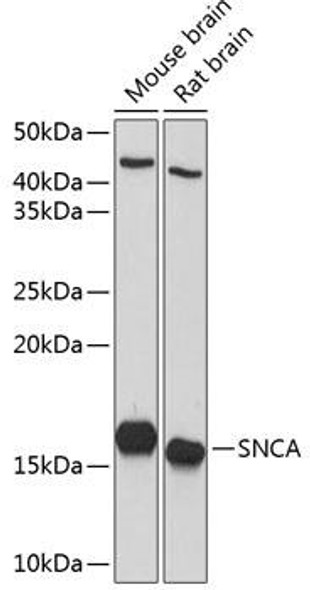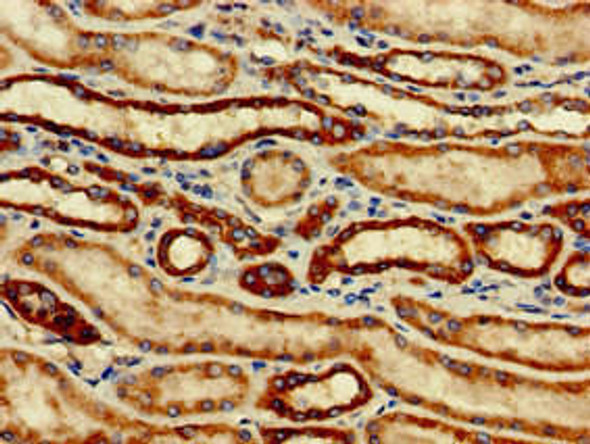Description
Snca Antibody (PACO30020)
The SNCA Polyclonal Antibody (PACO30020) is a valuable tool for researchers studying the alpha-synuclein protein, which is implicated in neurodegenerative diseases such as Parkinson's disease. This antibody, produced in rabbits, is highly specific for human samples and has been validated for use in Western blot applications.Alpha-synuclein is a key player in the pathogenesis of Parkinson's disease, as it forms aggregates in the brains of affected individuals. By targeting this protein with the SNCA Polyclonal Antibody, researchers can gain valuable insights into its expression and localization in various cell types.
This antibody is an essential component for studies investigating the role of alpha-synuclein in neurodegeneration and for the development of potential therapies targeting this protein. Its high reactivity and specificity make it a reliable tool for researchers in the fields of neuroscience and neurology.
| Antibody Name: | Snca Antibody (PACO30020) |
| Antibody SKU: | PACO30020 |
| Size: | 50ug |
| Host Species: | Rabbit |
| Tested Applications: | ELISA |
| Recommended Dilutions: | |
| Species Reactivity: | Rat |
| Immunogen: | Recombinant Rat Alpha-synuclein protein (1-140AA) |
| Form: | Liquid |
| Storage Buffer: | Preservative: 0.03% Proclin 300 Constituents: 50% Glycerol, 0.01M PBS, PH 7.4 |
| Purification Method: | >95%, Protein G purified |
| Clonality: | Polyclonal |
| Isotype: | IgG |
| Conjugate: | Non-conjugated |
| Background: | May be involved in the regulation of dopamine release and transport. |
| Synonyms: | Alpha-synuclein, Snca |
| UniProt Protein Function: | SNCA: a member of the synuclein family. Abundantly expressed in the brain. Inhibits phospholipase D2 selectively. May integrate presynaptic signaling and membrane trafficking. Implicated in the pathogenesis of Parkinson's disease. A major component of amyloid plaques in the brains of patients with Alzheimer's disease. Two alternatively spliced isoforms transcripts have been identified. |
| UniProt Protein Details: | Protein type:Adaptor/scaffold Cellular Component: actin cytoskeleton; axon; cell cortex; cell junction; cytoplasm; cytoplasmic vesicle membrane; cytoskeleton; cytosol; extracellular space; fibril; Golgi apparatus; growth cone; inclusion body; intracellular membrane-bound organelle; membrane; mitochondrion; nerve terminal; nuclear outer membrane; nucleus; perinuclear region of cytoplasm; plasma membrane; platelet alpha granule membrane; ribosome; rough endoplasmic reticulum; synapse; synaptic vesicle; terminal button Molecular Function:alpha-tubulin binding; arachidonic acid binding; beta-tubulin binding; calcium ion binding; caspase inhibitor activity; copper ion binding; dynein binding; enzyme binding; fatty acid binding; ferrous iron binding; histone binding; identical protein binding; kinesin binding; magnesium ion binding; microtubule binding; oxidoreductase activity; phospholipase binding; phospholipid binding; phosphoprotein binding; protein binding; protein domain specific binding; protein N-terminus binding; tau protein binding; zinc ion binding Biological Process: adult locomotory behavior; aging; behavioral response to cocaine; calcium ion homeostasis; caspase activation; dopamine biosynthetic process; dopamine metabolic process; fatty acid metabolic process; microglial cell activation; mitochondrial membrane organization and biogenesis; negative regulation of apoptosis; negative regulation of caspase activity; negative regulation of dopamine metabolic process; negative regulation of dopamine uptake; negative regulation of exocytosis; negative regulation of histone acetylation; negative regulation of microtubule polymerization; negative regulation of monooxygenase activity; negative regulation of neuron apoptosis; negative regulation of norepinephrine uptake; negative regulation of protein amino acid phosphorylation; negative regulation of serotonin uptake; negative regulation of transporter activity; neutral lipid metabolic process; organelle ATP synthesis coupled electron transport; phospholipid metabolic process; positive regulation of endocytosis; positive regulation of neurotransmitter secretion; positive regulation of peptidyl-serine phosphorylation; positive regulation of receptor recycling; positive regulation of release of sequestered calcium ion into cytosol; positive regulation of synaptic transmission; protein destabilization; receptor internalization; regulation of acyl-CoA biosynthetic process; regulation of dopamine secretion; regulation of excitatory postsynaptic membrane potential; regulation of glutamate secretion; regulation of locomotion; regulation of long-term neuronal synaptic plasticity; regulation of macrophage activation; regulation of neuron apoptosis; regulation of neuronal synaptic plasticity; regulation of neurotransmitter secretion; response to cocaine; response to drug; response to iron(II) ion; response to lipopolysaccharide; response to magnesium ion; synapse organization and biogenesis; synaptic transmission; synaptic transmission, dopaminergic; synaptic vesicle endocytosis; synaptic vesicle transport |
| NCBI Summary: | may play a role in regulation of synaptic vesicle biogenesis and organization; may be involved in neurotransmission [RGD, Feb 2006] |
| UniProt Code: | P37377 |
| NCBI GenInfo Identifier: | 9507125 |
| NCBI Gene ID: | 29219 |
| NCBI Accession: | NP_062042.1 |
| UniProt Secondary Accession: | P37377,P37378, Q53YM9, |
| UniProt Related Accession: | P37377 |
| Molecular Weight: | 41.9kD |
| NCBI Full Name: | alpha-synuclein |
| NCBI Synonym Full Names: | synuclein alpha |
| NCBI Official Symbol: | Snca |
| NCBI Protein Information: | alpha-synuclein |
| UniProt Protein Name: | Alpha-synuclein |
| Protein Family: | Alpha-synuclein |
| UniProt Gene Name: | Snca |
| UniProt Entry Name: | SYUA_RAT |











